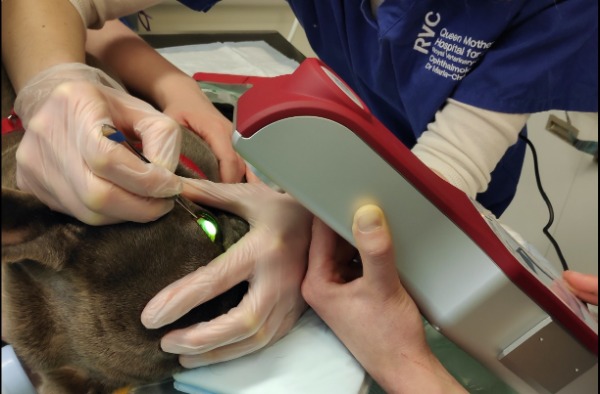The in-vivo effect of photoactivated chromophore for keratitis cross-linking (PACK-CXL) on bacterial growth in canine patients with infectious keratitis
Petplan Charitable Trust have funded a project to study "The in-vivo effect of photoactivated chromophore for keratitis cross-linking (PACK-CXL) on bacterial growth in canine patients with infectious keratitis".
This project is a collaboration between the QMHA ophthalmology department led by Dr. Maria Christine Fischer (PI) and Dr. Siân-Marie Frosini (Department of Pathobiology and Population Sciences).
Infectious keratitis (corneal ulceration) is a vision threatening condition predominantly involving bacterial pathogens and can progress to corneal melting without appropriate treatment. This pilot study aims to determine the ability of PACK-CXL to reduce bacterial load in canine infectious keratitis in vivo. PACK-CXL works by combining Ultraviolet A light and a chromophore. Photoactivation of the chromophore has shown to reduce the microbial load in vitro regardless of the antimicrobial resistance patterns. It has also been shown to arrest melting by aiding corneal stability.
The study will investigate the effect on the ulcer (pathogen killing / re-colonisation) and the commensal bacteria living in the conjunctival sack (‘knock-on’ effect). All dogs will receive routine medical treatment for infectious keratitis, with additional adjunctive PACK-CXL therapy (RVC). We anticipate this study will determine the potential role of PACK-CXL in reducing bacterial load in infectious keratitis informing the design of future protocols. The ultimate goal is improving management of these cases and reducing antimicrobial use.

You may also be interested in:
-
New research from the RVC predicts the future life expectancy for companion cats
New research from the Royal Veterinary College (RVC), in collaboration with researchers from the …

